Events
– 2021 –
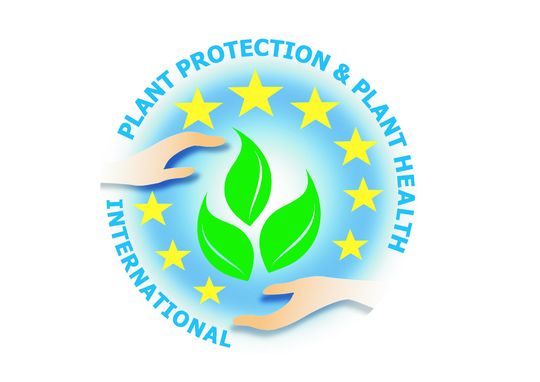
10th Symposium Plant Protection and Plant Health International – jointly organized by Deutsche Phytomedizinische Gesellschaft e.V. (DPG), Julius Kühn-Institut (JKI), and University of Hohenheim
23rd November, Video Conference
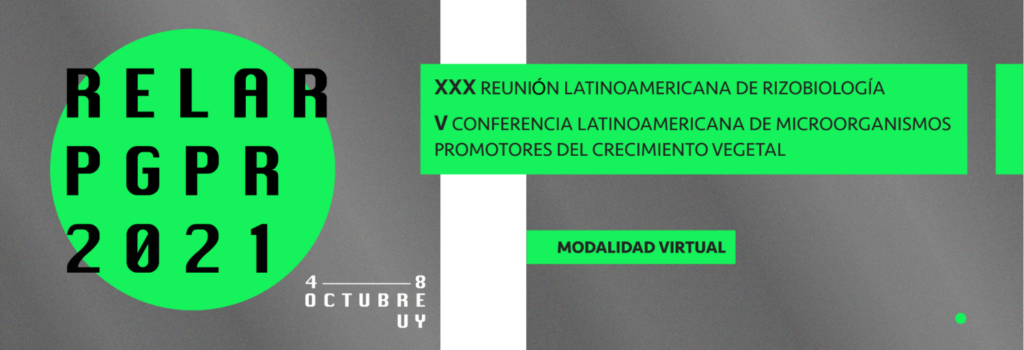
RELAR PGPR – Reunión Latinoamericana de Rizobiología V Conferencia Latinoamericana de Microorganismos Promotores del Crecimiento Vegetal (RELAR PGPR) Meeting
- Smalla K. : Soil microbiome modulation for improved plant growth and health

Industrieverband Agrar – 3. Symposium Biostimulanzien on the 29th of September
- Grosch R. : Können mikrobielle Biostimulanzien Wachstum und Gesundheit von Pflanzen in der landwirtschaftlichen Praxis verbessern?

V CAMAyA – 3. V Argentine Congress of Agricultural and Environmental Microbiology
- Smalla K.: Towards a more sustainable agriculture through managing soil microbiomes?

DPST – Deutsche Pflanzenschutztagung
The theme of this year’s Plant Protection Conference was “Healthy plants in responsibility for our world”. The DiControl team was able to present the whole range of aspects of the project to the audience in seven presentations.
Contribution- Grosch, R., Behr, J. H.; Sommermann, L., Geistlinger, J., Babin, D., Smalla, K., Moradtalab, N., Windisch, S., Neumann, G., Chowdhury, S. P., Rothballer, M.: Bedeutung von Mikroorganismen für Boden und Pflanzengesundheit
- Sommermann, L., Babin, D., Smalla, K., Deubel, A., Schellenberg, I., Grosch, R., Geistlinger, J.: Einfluss von langfristigen landwirtschaftlichen Maßnahmen und Jahreseffekten auf die pilzlichen Bodengemeinschaften in Weizen
- Moradtalab, N., Babin, D., Sommermann, L., Behr, J. H., Chowdhury, S. P., Windisch, S., Geistlinger, J., Smalla, K., Ludewig, U., Neumann, G., Grosch, R.: Konservierende Bodenbearbeitung fördert die Rhizosphärenakkumulation von Benzoxanoiden, pflanzenwachstumsstimulierende Bodenmikroorganismen und die Stressresilienz von Winterwe
- Windisch, S., Sommerman, L., Babin, D., Chowdhury, S. P., Grosch, R., Moradtalab, N., Walker, F., Höglinger, B., El-Hasan, A., Armbruster, W., Geinstlinger, J., Smalla, K., Rothballer, M., Ludewig, U., Neumann, G.: Differenzieller Einfluss langjähriger ökologischer und konventioneller Bewirtschaftung auf Rhizosphärenmetabolite, Interaktionen mit mikrobiellen Gemeinschaften im Boden und die Pflanzengesundheit von Salat (Lactuca sativa L.)
- Chowdhury, S. P., Babin, D., Sandmann, M., Sommermann, L., Fliessbach, A., Mäder, P., Geistlinger, J., Smalla, K., Rothballer, M., Grosch, R.: Beeinflussen langfristige organische und mineralische Düngung die Struktur der Mikrobiota in der Rhizosphäre von Salat und das die Pflanzengesundheit?
- Babin, D., Sommermann, L., Moradtalab, N., Behr, J. H., Chowdhury, S. P., Rothballer, M., Neumann, G., Geistlinger, J., Grosch, R., Smalla, K.: Auswirkungen der landwirtschaftlichen Bearbeitung und Applikation von nützlichen Mikroorganismen auf die Boden- und Rhizosphärenmikrobiota von Mais
- Behr, J. H., Moradtalab, N., Chowdhury, S. P., Sommermann, L., Babin, D., Rothballer, M., Neumann, G., Geistlinger, J., Smalla, K., Grosch, R.: Vom Labor auf den Acker: Rhizosphärenkompetenz von nützlichen Mikroorganismen und ihre Auswirkungen auf das Wachstum und die Gesundheit von Nutzpflanzen

Virtual agriculture – LET’S PLAY#5 Ecosystem Soil
In the Let’s Play episode, host and streamer André Lampe has Doreen Babin from the Julius Kühn Institute in Braunschweig & Jan Helge Behr from the Leibniz Institute of Vegetable and Ornamental Crops (IGZ) as guests on his virtual farm in “Farming Simulator 19”.
In the episode, Doreen Babin and Jan Helge Behr answer the questions: What influence does intensive agricultural use have on soil properties, the microbial community and the interaction between plants and microorganisms?

DMK – Plant Protection Conference
The Plant Protection Conference of the German Maize Committee took place on July the 14th as an online session. The main topics of the conference were pests and weeds in maize and their effective control.
- Behr J. H. Einfluss von nützlichenMikroorganismen auf die Pflanzengesundheit von Mais und Abhängigkeit von landwirtschaftlichenAnbaumaßnahmen (Presentation)

This year’s BonaRes Community event was held as a virtual meeting on June 16th-17th, 2021
Contribution
- Behr J. H. 2021. Influence of beneficial microorganisms on plant health of maize grown under different farming practices.(Presentation)
- Babin D., Behr J.H., Sommermann L., Moradtalab N., Chowdhury S.P., Ludewig U., Windisch S., Schellenberg I., Rothballer M., Neumann G., Geistlinger J., Grosch R., Smalla K. 2021. Long-term tillage practice influences microbial-plant interactions in winter wheat. (Poster)
- Sommermann L., Babin D., Behr J.H., Moradtalab N., Chowdhury S.P., Smalla K., Rothballer M., Neumann G., Schellenberg I., Grosch R., Geistlinger J. 2021. Effect of beneficial microorganisms on rhizosphere microbiota. (Poster)
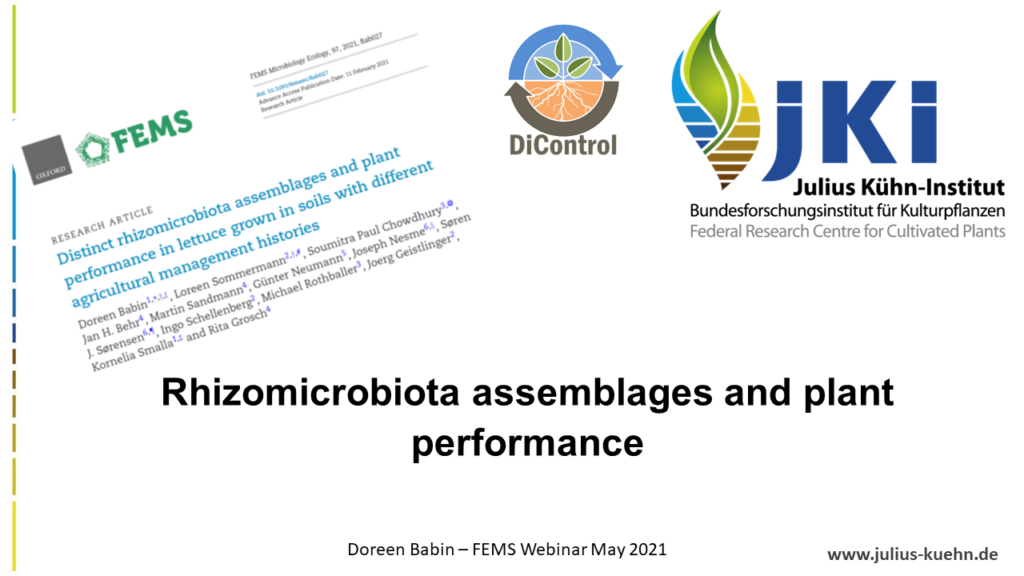
FEMS Microbiology Ecology Webinar on Sustainable Agriculture and Soil Microbiomes at the 20th of May
The FEMS Microbiology Ecology Webinar addresses sustainable agriculture by showing the interactions between common crops and their microbiomes. In her presentation, Darin Babin demonstrates how modern sequencing techniques can be used to link rhizomicrobiota assemblages and plant performance.
- Babin, D. Rhizomicrobiota assemblages and plant performance (Presentation)

Industrieverband Agrar, Department of Plant Nutrition and Biostimulants – virtual meeting at the 22nd of April
- Grosch, R. Auswirkungen des pflanzenbaulichen Managements sowie der Anwendung mikrobieller Biokontrollstämme auf Bodengesundheit nachhaltige Pflanzenproduktion. (Presentation)

Annual meeting of the DPG working group – “Biological control of plant diseases“
The DiControl team presented their results of the second phase at the annual meeting of the DPG working group – “Biological Control of Plant Diseases“
Contribution- Babin D. and Moradtalab N. Experimental approach for field evaluation of root exudate and microbiome interactions in winter wheat depending on long-term agricultural management (Presentation)
- Behr J. H. Farming-dependent rhizosphere competence of beneficial microbes and their effects on maize at field scale (Presentation)

International Biocontrol Manufacturers Association – virtual meeting at the 17th of March
- Grosch, R. Mikrobielle Inokulantien und ihre Bedeutung im Feld: Erkenntnisse aus Langzeitversuchen im Verbundprojekt DiControl. (Presentation)

Workshop “Innovative Lehrformate” of the Univercity Hohenheim at the 25th of February
Organized by CAAST (Community for applied agricultural sustainability teaching) – Projects in teaching
Participant: Maradtalab N.
– 2020 –

1st Florence ISME Day, Florenz, 18th Dez 2020
- Smalla K. 2020 Microbial biostimulants: rhizocompetence, plant beneficial activity and effects on the indigenous microbial community (Presentation)

The Science Slam-Talks – “Science Slam-Talks im Wissenschaftsjahr 2020/21 – Bioökonomie” – is a project founded by the BMBF to clear up prejudices and to transfer knowledge in the field of bio-economics to a broader audience. During the presentation Dr. Doreen Babin explains how microorganisms form the soil memory and thereby contribute to a healthy soil. In an easy-to-follow and entertaining way she gives insights into recent methodologies and experiments from DiControl. The talk is followed by questions and discussions how this knowledge can contribute to a sustainable agriculture.
Contribution- Babin D. 2020 Wie Mikroorganismen zum Gedächtnis und zur Gesundheit des Bodens beitragen (Presentation)

Microverse I – Microbial and Biomolecular Interactions
The first international symposium “Microverse I – Microbial and Biomolecular Interactions”, organized by the Microverse Cluster and the Collaborative Research Centers ChemBioSys and AquaDiva, brought together national and international scientists to discuss the latest advances in microbial communication, host-microbiome interactions and environmental microbiomes.
Contribution- Babin D, Grosch R, Smalla K Harnessing soil-plant-microbie interactions for a more sustanable agriculture

The first virtual LTE workshop for LTE research methods, standardisation and modelling was conducted at 1st to 2nd of October 2020. The workshop was organized by the Bonares Center for Soil Research, funded by the Federal Ministry of Education and Research (BMBF) and aims to exchange experiences about the application of modern standards in LTEs and to derive recommendations for the use of these trials for ecosystem research and modelling. The workshop discussed the requirements for statistical evaluation and data acquisition of LTEs, and methods and selected results of biological, chemical and physical soil parameters will be presented.
Summary of ContributionSoil microbiota and the health of plants
Doreen Babin1, Narges Moradtalab2, Jan Behr3, Soumitra Paul Chowdhury4, Loreen Sommermann5, Lorrie Maccario6, Søren J. Sørensen6, Annette Deubel5, Michael Rothballer4, Joerg Geistlinger5, Günter Neumann2, Kornelia Smalla1, Rita Grosch3
1Julius Kühn-Institut, Federal Research Centre for Cultivated Plants (JKI), Institute for Epidemiology and Pathogen Diagnostics, Braunschweig, Germany; 2University of Hohenheim, Institute of Crop Science (340h), Stuttgart, Germany; 3Leibniz Institute of Vegetable and Ornamental Crops (IGZ),Großbeeren, Germany; 4Institute of Network Biology, Helmholtz Zentrum München, German Research Center for Environmental Health, Germany, 5Anhalt University of Applied Sciences, Department of Agriculture, Ecotrophology and Landscape Development, Bernburg, Germany; 6University of Copenhagen, Department of Biology, Section of Microbiology, Copenhagen, Denmark;
Conventional agricultural practices based mainly on the input of synthetic fertilizer and pesticides which have increased productivity, but has resulted in a number of negative impact on soil functioning and quality. Nearly all relevant soil processes are microbe-mediated and are key factors for soil functions and plant productivity. A better understanding of soil-plant-microbe interactions in agroecosystems may pave the way towards a more sustainable agriculture. We therefore aimed to study the effect of different long-term farming practices on the soil and rhizosphere microbiota as well as plant performance (growth, health, root exudates). A long-term field experiment in Bernburg (Germany, 1992) served as study site, which allows comparing of two soil management practices (mould-board plough vs. cultivator tillage) as well as nitrogen fertilization intensities (intensive fertilization including fungicides vs. reduced extensive fertilization without fungicides). Soil samples were collected from the different treatments and the model plant lettuce (Lactuca sativa, L. cv. Tizian) cultivated in the respective soil samples for 10 weeks under controlled climate chamber conditions. High-throughput sequencing of bacterial 16S rRNA genes or fungal ITS fragments, respectively, PCR- amplified from total community DNA of rhizosphere and soil samples showed significant differences in microbial community compositions depending on the long-term farming practices. Moreover, differences depending on long-term agricultural management in plant growth and health as measured by RT-qPCR of stress-related plant genes were observed. Quantity and quality of lettuce root exudates differed among the soil treatments and indicated different stress potentials of farming practices on plants. Under controlled growth chamber conditions, we could show that the lettuce rhizosphere microbiota assemblage as well as plant growth and health are significantly influenced by farming practices. We suggest a farming-dependent legacy on the performance of the subsequent crop generation via belowground plant-microbiota interactions.

The BonaRes Community event was conducted from the 17th to 19th of February 2020 at the KUBUS in Leipzig. The annual status seminar was the second of its kind in the 2nd funding phase of the BonaRes funding initiative.
Contribution
- Moradtalab N. 2020. Experimental approach for field evaluation of root exudate and microbiome interactions in winter wheat depending on long-term agricultural management. (Presentation)
- Babin D., NitkaJ., Chowdhury S.P., Behr J.H., Deubel A., Rothballer M., Grosch R., Smalla K. 2020. Does the tillage-shaped soil microbiome influence the assembly of the rhizomicrobiota and their plant interactions? (Poster)
- Behr J.H., Sommermann L., Babin D., Windisch S., Moradtalab N., Chowdhury S.P., Geistlinger J., Deubel A., Neumann G., Smalla K., Grosch R. 2020 Effect of long-term agricultural practices on the performance of field-grown crops and soil fungal communities. (Poster)
- Chowdhury S.P., Babin D., Sommermann L., Behr J. H., Sandmann M., Geistlinger J., Smalla K., Rothballer M, Grosch R. 2020. Long-term fertilization strategies influence defense reactions in lettuce plants towards the pathogen Rhizoctonia solani (Poster)
- Sommermann L., Babin D., Behr J.H., Chowdhury S.P., Moradtalab N., Windisch S., Deubel A., Smalla K., Rothballer M., Neumann G., Schellenberg I., Grosch R., Geistlinger J. 2020. Effects of precrops on the performance of winter wheat and soil microbial communities. (Poster)
- Moradtalab N. Chowdhury S.P., Sommermann L., Babin D., Behr J., Windisch S., Geistlinger J., Smalla K., Neumann G. Ludewig U., Grosch R. 2020. Root development and exudation of wheat plants collected from root windows installed in the filed with different soil management (Poster)
- Moradtalab N. Chowdhury S.P., Sommermann L., Babin D., Behr J., Windisch S., Geistlinger J., Smalla K., Neumann G. Ludewig U., Grosch R. 2020. Root characteristics and physiological health indicators of winter wheat as affected by pre-crops, tillage-, and fertilization-intensity (Poster)

At the IPM 2020, the DiControl project was able to present the current research status of the project at the IGZ trade fair appearance. Through posters and exhibits such as models of plant-microorganism interaction, root windows, microscopy of beneficial microorganisms, and live demonstrations, the DiControl team made visitors aware of the impact of beneficial microorganisms on plant health and their use in sustainable agriculture. The IPM is the leading horticultural trade fair revolves around solutions and innovations in the green sector.
– 2019 –

INIA-JKI organized Workshop in Montevideo
From the 14th to 16th of November 2019 the JKI and its Uruguayan partner INIA (Instituto Nacional de Investigación Agropecuaria) organized an international workshop at Montevideo/Uruguay adjacent to the REDBIO conference. Here the role of soil microbiomes in agro-ecosystems for soil and plant health and the potential for development of more sustainable farming practices were discussed. Unique opportunity were offered to initiate bilateral projects aiming at developing a hypothesis-driven research frameworks. The aim is to better understand the mechanistic effects of agricultural management practices on soil microbiomes and interrelations in agricultural soils residing in different geographic and climatic zones.
Contribution- Sommermann L., Geistlinger J. 2019. Profiling of Fungal and Oomycete Communities in Agricultural Soils under Different Long-term Farming Practices. (Presentation)
- Babin D, Chowdhury SP, Sandmann M., Sommermann L, Geistlinger J., Rothballer M., Grosch R, Smalla K.: Microbe-mediated soil memory in agroecosystems – Implications for plant performance. (Presentation)

The main objective of the REDBIO meeting, hosted in Uruguay from the 14th to the 16th of October 2019, was to promote the development and implementation of safe biotechnologies for agricultural development. The goal of this meeting is to maintain food security and the conservation of genetic resources in Latin America and the Caribbean.
Contribution- Smalla K. 2020 The rhizosphere microbiome-key for plant health and growth (Presentation)

6th Asian PGPR International Conference
The 6th Asian PGPR international conference was conducted at the 18th to the 21st of August 2019 in Toshkent, Uzbekistan. The Asian PGPR Society for Sustainable Agriculture is a scientific society that was formed in 2009 as a non-profit organization. It aims to enable scientists, researchers, academicians, government groups, students, farmers, and industry personnel to meet and discuss their common interests in teaching, research and commercialization of PGPR.
Contribution- Chowdhury S.P., Babin D., Sommermann L., Windisch S., Neumann G., Rothballer M., Geistlinger J., Smalla K., Grosch R. 2019. Impact of long-term farming practices on rhizosphere microbiota and plant health. (Presentation)
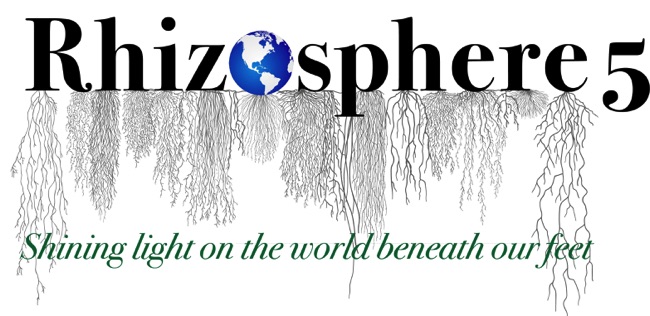
The international conference Rhizosphere 5 took place from the 7th to the 11th of July 2019 in Saskatoon, Canada. All DiControl project partners were represented at this multidisciplinary forum for exchanging innovative ideas and methods for studying the rhizosphere and understanding its complexity and its role in both natural and agricultural ecosystem processes.
Contribution- Babin D., Chowdhury S.P., Sandmann M., Sommermann L., Windisch S., Deubel A., Neumann G., Geistlinger J., Smalla K., Rothballer M., Grosch R. 2019. Long-term farming practices shape the rhizosphere microbiota and plant health. (Presentation)
- Chowdhury S.P., Babin D., Behr J.H., Sandmann M., Sommermann L., Geistlinger J., Smalla K., Rothballer M., Grosch R. 2019. Multifactorial influence of long-term agricultural management practices on rhizosphere microbiota assemblage and performance of lettuce. (Poster)
- Windisch S., Babin D., Behr J.H., Chowdhury S.P., Sommermann L., Moradtalab N., Smalla K., Geistlinger J., Grosch R., Neumann G. 2019. The impact of long-term fertilization management on rhizodeposition and its role on the rhizosphere-microbial communities and health status of lettuce. (Poster)

The European Geosciences Union (EGU) is the leading organisation for Earth, planetary and space science research in Europe. The General Assembly 2019 of the European Geosciences Union (EGU) was held at the Austria Center Vienna (ACV) in Vienna, Austria, from 7–12 April 2019.
Contribution- Smalla K. 2020 The rhizosphere microbiome-key for plant health and growth (Presentation)

The 13th Dahlia Greidinger International Symposium 2019
The symposium, held March 4-6 at the Technion in Haifa, Israel, aimed to develop strategies for addressing the challenges of securing global food production under increasing environmental pressures. A particular focus was the preservation of soil fertility under the increasing threat of water scarcity and other ecological and environmental challenges.
Contribution- Smalla K. 2019 The rhizosphere microbiome-key for plant health and growth (Presentation)

11th RegioPlant Science Meeting in Hohenheim
- Windisch S., Babin D., Grosch R., Chowdhury S.P., Moradtalab N., Neumann G. 2019. Implications of long-term fertilization management on rhizosphere microbiota and adaptive rhizodeposition in Lactuca sativa. (Poster)

Annual meeting of the DPG working group – “Biological control of plant diseases“
The working group “Biological Control of Plant Diseases” is a part of the German Phytomedical Society and mainly deals with the control of plant diseases by biological management techniques. The annual meeting at the 26th of March 2019 has given working groups from all over Germany the opportunity to exchange ideas and discuss new aspects of biological crop protection. The aim of the working group is to develop strategies for biological control of plant diseases by monitoring the emergence of resistant pathogens and resistance plant breeding, the Identification of pathogen control gaps that can be closed with biological control methods and the search for suitable organisms for biological control of plant diseases.
Contribution- Babin D., Chowdhury S P., Sandmann M., Sommermann L., Geistlinger J., Smalla K., Rothballer M., Grosch R. 2019. Impact of long-term farming strategies on the rhizosphere microbiota and plant performance. (Presentation)
- Grosch R., Babin D., Chowdhury S.P, Sandmann M., Sommermann L., Fließbach A., Mäder P., Geistlinger J., Rothballer M., Smalla K. 2019. Impact of long-term fertilization strategy on plant performance. (Presentation)

The BonaRes Community event was conducted from the 19th to 21th of February 2019 at the KUBUS in Leipzig. The annual status seminar was the first of its kind in the 2nd funding phase of the BonaRes funding initiative.
Contribution- Babin D., Chowdhury S., Sommermann L., Geistlinger J., Neumann G., Windisch S., Smalla K., Rothballer M., Grosch R. 2019. Impact of long-term agricultural management practices on the rhizomicrobiota and plant performance. (Presentation)
- Chowdhury S.P., Babin D., Sandmann M., Jacquiod S., Sommermann L., Sørensen S.J., Fliessbach A., Mäder P., Geistlinger J., Smalla K., Rothballer M, Grosch R. 2019. Effect of long-term organic and mineral fertilization practice on rhizosphere microbiota establishment and performance of lettuce. (Poster)
- Windisch S., Babin D., Grosch R., Chowdhury S.P., Moradtalab N., Neumann G. 2019. Implications of long-term fertilization management on rhizosphere microbiota and adaptive rhizodeposition in Lactuca sativa (Poster)
- Sommermann L., Stelte M., Deubel A., Hüttel B., Schellenberg I., Grosch R., Geistlinger J. 2019. How does long-term farming strategy influence the Oomycetes in different soil horizons? (Poster)
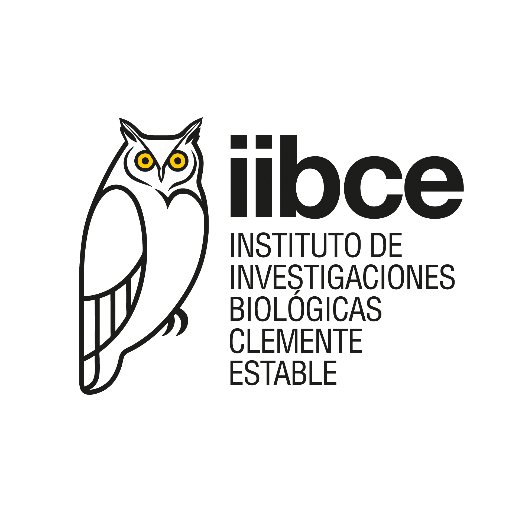
Colloquium Instituto Clemente Estable 31.1.2019, Montevideo, Uruguay
- Smalla K The rhizosphere microbiome-key for plant health and growth (Presentation)